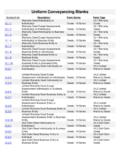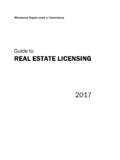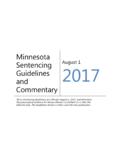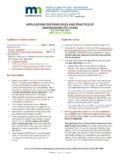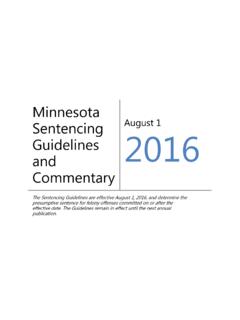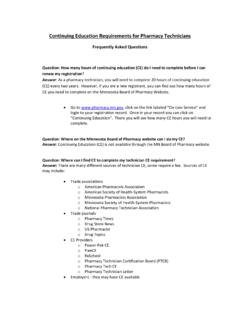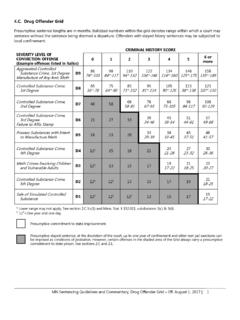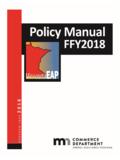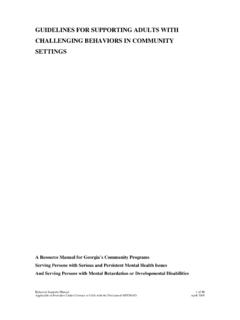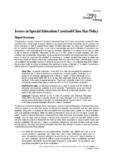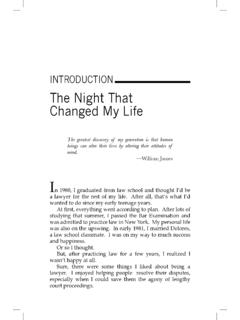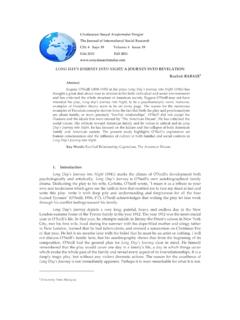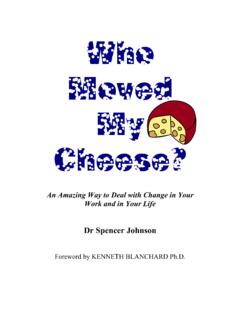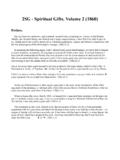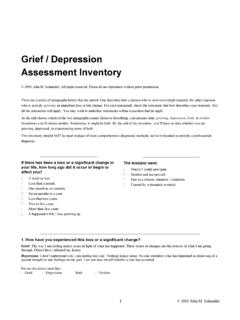Transcription of It’s My Choice - index / Minnesota.gov
1 It s My s Council onDevelopmental DisabilitiesIt s My ChoicebyWilliam T. Allen, T. AllenAllen, Shea & Associates 1780 Third Street Napa, CA 94559707. 707. 2003 Reprinted 2009 Reprinted 2011 Reprinted 2013 Reprinted 2014 PrefaceIt is hoped that the information in this guide is written in a way that is easy to understand. This was done for several reasons:n so that people with developmental disabilities who read, can read it and use it;n so that people who advocate for those who cannot read can explain it more easily;n so that we can all activities and checklists contained in this guide have beenused in a variety of ways. Any of the materials can be copied orchanged to meet the needs of people in your area. Table of ContentsIntroduction 2 Individual Assessment4 Listen to Me! 5A Game Plan for You 18 Individual Plans 25 Individual Program Planning Guide 26 Transition Planning Guide 31 Individual Employment Planning Guide 41 Individual Checklists 48 The Place of My Own Checklist 49 The Housing Checklist 52 The Workplace Checklist 60 Staff Evaluation Form 65 Looking at My Own Life Quality 66 Ideas on Making Things Easier 78 Supporting Self Advocacy 821 IntroductionHard choices, big decisions.
2 Are these the things I want to learn?Is this the kind of work I want to do? Is this where I want to live? How should I spend my money? Should I get married? Have a family? What will I do when I retire? These are some of the big decisions that all of us must make at different times in our , there are those nagging little ones that become a part of our everyday life. Should I sleep for 10 more minutes? What should I wear? Should I drive to work or carpool? Should I drink another cup of coffee? How about dessert? What s on TV? As hard as it may seem, none of us would give up the freedom to make decisions in our everyday first step Family members, friends, social workers, servicecoordinators, service providers and advocatescan help people with developmental disabilitiesget the services and supports they need to:n lead the lifestyles they prefer;n be more independent; andn be active members of the can do this by supporting people in theirfreedom of resource guide will look at ways that youcan help support freedom of Choice for people with developmental disabilities:n Looking at individual needsn Planning for servicesn Evaluating servicesn Making things more understandablen Supporting self advocacyAn exampleOne of the first checklists you willfind is the Individual Program Planning you decide to use it, the agenda you wouldfollow for the individual annual planning meeting might look like this.
3 N Introductions Everyone who is attending the meeting states who they are and how they can help support the Purpose of the meeting It is explained that the purpose of the meeting is to share information about strengths, needs, hopesand dreams and to come up with some plans that will help the individual move towards a preferred lifestyle now and in Sharing information This is a chance for the individual, family and friends, and thosewho work with him or her to talk aboutwhat is important to the individual and what it takes to successfully support him or her at home, at work and in the community. This is a time to review some-thing like the Individual Program Planning Guide or Listen to Me, a PATH, oran Essential Lifestyle Plan, etc. In addition, the individual may have made an audio orvideotape of his or her ideas about Making plans This is the time to develop plans for the next year which will help the individual move towards his or herpreferred lifestyle at home, at work and in the community.
4 Everyone must agree on them and the individual has the last considerationsIt is hoped that youdecide to use these checklists and activities inyour work. There are a few additional thingsto remember when adapting them to the needs ofpeople with developmental disabilities in yourarea:n Language diffe rences You might want to have the materials translated into different Ethnic-cultural diffe rences You might want to consider where to hold the home interview, planning conference, etc. based on personal Procedural diffe rences Agencies have different procedures regarding planning and evaluating services, etc. These materialscan be cut and pasted to work around those is person-centeredplanning?Person-centered planning isn t so new and itisn t hard to do. It s really as easy as listening topeople with developmental disabilities (or theirfamilies if someone is very young) about thingslike:n where to live;n how to spend time each day;n who to spend time with; and,n hopes and dreams for the s also about supporting people in the choicesthey make about their life.
5 That can be the hard part!Individual Assessment4 More about person-centered planningPlanning aheadWe all have hopes and dreams for the we can work for on our own, many takesupport from others. Some will happen, somewill planning is one way of figuringout where someone is going (life goals) andwhat kinds of support they need to get of it is asking the person, their family,friends and people who work with him or herabout the things she or he likes to do (preferences) and can do well (strengths andcapabilities). It is also finding out what thingsget in the way (barriers) of doing the things peo-ple like to do. If people can t talk for them-selves, then it s important to spend time withthem and to ask others who know them things to remember about person-centered planning are:n people with developmental disabilities (ortheir families and friends if they can t speakfor themselves) are in the driver s seat; and,n it s about supporting the many different ways that people choose to is this workbook about?
6 In this workbook, you will have a chance to think about your life and the kinds ofthings that are important to you. When you re done, you will have finished ListentoMe! This information can be used to help build your Individual Program Plan(IPP). On each page you will find a question and some words about what it s best to do this workbook with people who know and care about , this is just one way to start the person-centered planning !This workbook belongs to:Do you have a photograph of yourself? Put it in the frame!5 Who is a part of your life?Who are the people you are close to? people in your family? people at work orschool? neighbors and friends? Who are the people you do things with? talk to?turn to for help?Who do you spend the most time with? Who are the people who know you best?Who are the people who are most important to you?These are people who you might want to invite to your person-centeredplanning meeting. Or, they might be able to support you in your plans for the about who they are and write their names in these circles.
7 Some people writethe names of people who are closest to them in the middle, but you can do it anyway you are some things to think aboutwhen you re working on Listen to Me:n Pick a place to work where you arecomfortable;n Invite people who know and care aboutyou (your friends, relatives, neighbors,service coordinator, service provider) tomeet with you and help you fill out theworkbook; andn When you get together, make sureeveryone knows each other and thatthey re there to support you;6Yo uWhat are some great things about you?What are some great things about you? What do you like about you?What are some things you're good at? proud of? What are some nice things thatpeople say about you? What do people thank you for? This is sometimes hard forpeople to answer, so you might want to start by asking a friend or are important things to think about when you are figuring outthe kinds of services and supports you need and want. List them here:Here are some things to think about whenyou re working on Listen to Me:n Someone should lead the meeting andsomeone should write down what youand your team say in the workbook;n The person who leads the meeting should make sure everyone gets a chance to talk and that people listen;n Have a good time, be positive; and,n Ask the person who was writing thingsdown to go over them with you to make sure everything is just like you want things do you like to do?
8 List your favorite things ..8To help you get started on your lists, askyourself and people who know you: What things do you like to do? at home? at work? at program? at college? for fun?around town? on vacation? What kind of music do you like? What kind of movies do you like? What kind of food do you like? Do you have any hobbies? Do you collect things? What are the things youdon t like or don t like to do? Did you do something before that you liked todo (like a class or a job)?What things don t you like to do?List things you don t like or don t like to do ..910 The week dayWhat do you do when you first get up? What does your Monday through Friday morning look like right now? What do you eat for breakfast? When do you leave for work? Next, what would be your best Monday through Friday morning? If you could bedoing anything, what would it be? Finally, what would be your worstMonday through Friday morning? What kinds of things make you mad, sad, frustrated in the morning?
9 What kinds of things bug you when you first get up?What do you do when you first get to work or program or school? What kinds of work or activities do you do now? Next, what would be your bestMonday through Friday? If you could be doing anything, what would it be? What kinds of activities make you happy? Who would you do them with? Finally, what would be your worst Monday through Friday? What kinds of things make you mad, sad, frustrated during the day? What places (or people) would you like to stay away from?What do you do when you first get home? What do you have for dinner? What kinds of activities do you do now? Next, what would be your best Monday through Friday night? If you could be doinganything, what would it be? What kinds of activities make you happy?Who would you do them with? Finally, what would be your worst Monday throughFriday night? What kinds of things make you mad, sad, frustrated during theevening?The best week day would week day right worst week day would is different about the weekend?
10 First, what does your Saturday and Sunday morning look like right now? Is there anything different about the weekend during the morning, in the afternoon,evening?Next, what would be your best Saturday and Sunday? If you could be doing anything, what would it be?Finally, what would be your worst Saturday and Sunday?12 The best weekend day would weekend day right worst weekend day would is most important to you?Look back at the things you wrote downor said when we talked about who is inyour life. What are the great things aboutyou? What are the things you like to do, andwhat are your best and worst week day andweekend?What is mostimportantfor us to remember?What things do you want to make sure are inyour life every day (like a cup of coffeein the morning or a favorite friend)? Whatthings do you want to make sure are not inyour life every day (like a certain kind of musicor some food you can t stand)? How can we successfully support you withthose things that are most important?
